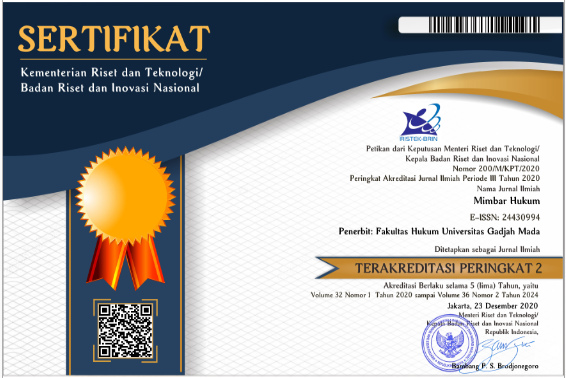HUMAN RIGHTS PROTECTION FOR INDONESIAN MIGRANT WORKERS: CHALLENGES FOR ASEAN
Win Sherly Tan(1*), Rina Shahriyani Shahrullah(2)
(1) Universitas Internasional Batam
(2) Universitas Internasional Batam
(*) Corresponding Author
Abstract
Abstract
The AEC is good news for Indonesian migrant workers wanting to work overseas. Unfortunately, many Indonesian migrant workers have been deported from ASEAN countries because of having problems. This study adopts the normative legal research method. It argues that AICHR may be slow in resolving the problems of human rights. It is also argued that the ASEAN Committee on Migrant Workers works in the absence of the political commitment of ASEAN leaders to implement the Cebu Declaration. Therefore, the best solution is public participation in the ASEAN countries to protect migrant workers.
Intisari
Komunitas Masyarakat Ekonomi ASEAN adalah berita baik untuk Tenaga Kerja Indonesia (TKI) untuk bekerja di luar negeri. Namun, banyak TKI yang kembali dari negara-negara ASEAN dikarenakan mendapatkan berbagai permasalahan. Penelitian ini mengadopsi jenis penelitian hukum normatif. Penelitian ini menyimpulkan bahwa AICHR lamban dalam menyelesaikan permaslahan tentang hak asasi manusia. Penelitian ini juga menyimpulkan bahwa komunitas ASEAN tentang Pekerja Migran bekerja dengan tidak adanya komitmen politik dari para pemimpim ASEAN dalam menerapkan Deklarasi Cebu. Oleh sebab itu, dibutuhkan partisipasi ASEAN dalam melindungi TKI.
Keywords
Full Text:
PDFReferences
ANTARA, “Kasus TKI BermasalahTerbanyakSoalGajiTakDibayarMajikan”, http://www.antarakl.com/index.php/naker/1103-kasus-tki-bermasalah-terbanyak-soal-gaji-tak-dibayar-majikan, accessed on 28 December 2011. ASEAN Economic Community Blueprint, Jakarta, ASEAN Secretariat, January 2008, p.5, available from www.asean.org/archive/5187-10.pdf. Human Rights Watch, “Abuses against Female Migrant Domestic Workers in Indonesia and Malaysia”, available on http://www.hrw.org/reports/2004/07/21/help-wanted, July 2004 Vol. 16, No. 9 (B). Mekanisme HAM di ASEAN: Peluang Penegakan HAM di Tingkat Regional, http://www.kalyanamitra.or.id/2013/02/mekanisme-ham-di-asean-peluang-penegakan-ham-di-tingkat-regional/, accessed on 6 February 2013. UN Women, Managing Labour Migration in ASEAN: Concerns for Women Migrant Workers, p.9, available from www.unwomen.org; http://asiapacific.unwomen.org. Mahidol Migration Centre, Institute for Population and Social Research, Mahidol University, “Migrant Workers’ Right to Social Protection in ASEAN: Case Study of Indonesia, Philippines, Singapore and Thailand”, http://www.ilo.org, accessed on 8 September 2011. Nasib Buruh Migran di Regional ASEAN, http://www.migrantcare.net/mod.php?mod=publisher&op=printarticle&artid=1451, accessed on 5 May 2011. Rahman Fathor, “Menghakimi TKI : Mengurai Benang Kusut Perlindungan TKI”,(Cetakan Pertama, Jakarta, 2011). Statement of the Establishment of the ASEAN Committee on the Implementation of the ASEAN Declaration on the Protection and Promotion of the Rights of Migrant Workers, http://www.asean.org/communities/asean-political-security-community/item/statement-of-the-establishment-of-the-asean-committee-on-the-implementation-of-the-asean-declaration-on-the-protection-and-promotion-of-the-rights-of-migrant-workers, accessed on 30 July 2007.
Article Metrics
Refbacks
- There are currently no refbacks.
Copyright (c) 2017 Win Sherly Tan, Rina Shahriyani Shahrullah

This work is licensed under a Creative Commons Attribution 4.0 International License.




